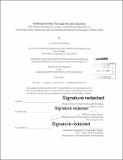| dc.contributor.advisor | Judy Layzer. | en_US |
| dc.contributor.author | Howe, Caroline Louise | en_US |
| dc.contributor.other | Massachusetts Institute of Technology. Department of Urban Studies and Planning. | en_US |
| dc.coverage.spatial | a-ii--- | en_US |
| dc.date.accessioned | 2014-09-19T21:45:52Z | |
| dc.date.available | 2014-09-19T21:45:52Z | |
| dc.date.copyright | 2014 | en_US |
| dc.date.issued | 2014 | en_US |
| dc.identifier.uri | http://hdl.handle.net/1721.1/90204 | |
| dc.description | Thesis: M.C.P., Massachusetts Institute of Technology, Department of Urban Studies and Planning, 2014. | en_US |
| dc.description | Cataloged from PDF version of thesis. | en_US |
| dc.description | Includes bibliographical references (pages 51-54). | en_US |
| dc.description.abstract | Rapid population growth, urbanization and increasing affluence have led to increases in consumption and waste generation in all Indian cities. The current system, a mix of informal recyclables collection and centralized waste collection by the formal sector with much garbage still disposed of in unlined landfills, is at a point of crisis. With waste generation far outpacing processing capacity, cities know they must invest in "improving" waste management systems, yet a key question is whether to invest in centralized or decentralized, formal or informal waste systems, or combine the strengths of both. This research asks what approach to waste management in India will increase stability, economic and environmental sustainability, and social benefit. To answer those questions, I conducted a case study of Pune, since the city has implemented centralized waste processing, followed by supporting informal sector collection and instituting decentralized collection. The diversity of its methods and the many challenges Pune has faced have allowed me to analyze the benefits, impacts and limitations of each of these approaches. For the case study, I conducted more than 50 interviews of city staff, waste pickers, waste picker cooperative staff, restaurant managers, and citizens. Based on this analysis, and comparison to other Indian cities, including Delhi and Bangalore, I have concluded that the best solution for most Indian cities is to build the capacity of the informal sector while also creating decentralized processing infrastructure to handle organics and non-recyclable waste. While this approach is challenging, it is possible, and I have created a set of recommendations in order to implement this effectively. These guidelines include the following: 1) conduct long-term planning across city departments to have proactive approach to waste generation; 2) focus on waste reduction and eliminate most non-recyclable and non-biodegradable waste streams; 3) invest in the capacities of the informal sector, including giving waste pickers space for sorting, more information on their rights, and support; 4) build decentralized waste processing systems for organics and non-recyclables that create benefits for and minimize impacts on host communities; and 5) site all facilities more equitably by building community consensus. | en_US |
| dc.description.statementofresponsibility | by Caroline Louise Howe. | en_US |
| dc.format.extent | 54 pages | en_US |
| dc.language.iso | eng | en_US |
| dc.publisher | Massachusetts Institute of Technology | en_US |
| dc.rights | M.I.T. theses are protected by copyright. They may be viewed from this source for any purpose, but reproduction or distribution in any format is prohibited without written permission. See provided URL for inquiries about permission. | en_US |
| dc.rights.uri | http://dspace.mit.edu/handle/1721.1/7582 | en_US |
| dc.subject | Urban Studies and Planning. | en_US |
| dc.title | Building stability through decentralization : the environmental, economic, and ethical argument for informal sector collection and decentralized waste processing in urban India | en_US |
| dc.type | Thesis | en_US |
| dc.description.degree | M.C.P. | en_US |
| dc.contributor.department | Massachusetts Institute of Technology. Department of Urban Studies and Planning | |
| dc.identifier.oclc | 890371153 | en_US |
